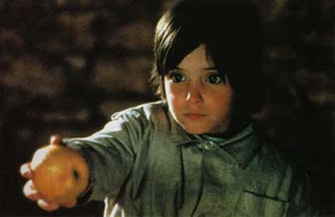Sole Criterion: The Spirit of the Beehive
By Brett Ballard-Beach
November 23, 2012
Erice often frames the two sisters against the vastness of the plain, or in my favorite image, the roar and power of the local train speeding by as they stand just off to the side (this is captured in a medium distance shot). They have that peculiar but recognizable older sibling/younger sibling dynamic in which the moments in which they can play alongside one another are tempered by the ones in which Isabel delights in teasing or tormenting Ana. This leads to the centerpiece of the film, in which Ana responds to Isabel’s cry for help from another wing in the house, and discovers Isabel apparently dead. This sequence lasts about five minutes and toys mercilessly with the audience in a manner befitting Hitchcock. The audience gets to mirror Ana’s concern and conflict (“She can’t really be dead. Can she? Can she?”) The unease that is crafted is potent, even after one knows how it plays out.
I am a fan of ambiguity, of not having my hand held and told how to feel, of not having everything explained to me, but I also respond to the emotion that cinema can evoke, particularly when it isn’t trying (or refrains from) bludgeoning me over the head with sentimentality. Erice shows such restraint, which I respect, and made precisely the film that he wanted to. And yet, in the final analysis, I felt left out in the cold by the film, a feeling confirmed by my second viewing. There is definite circularity to the movement of the film (confirmed by Erice and his collaborators) and the end result isn’t so much “ah, this is where I came in” or a return to the beginning, but puzzlement over what if anything has changed.
There are suggestions that warmth that was missing may be returning to the family (contrast the mother’s gestures towards her husband at the end, with the single shot sequence towards the beginning where she feigns being asleep as her husband prepares for bed) but I remain uncertain (or perhaps) unconvinced about the act of faith that closes the film. As with the rest of the film, it is not a bold gesture, but one that takes place internally, between Ana and her imagination. I listened to Erice explain his feelings about it, but as presented I don’t regard it as a summation, or an (up) lifting moment. It feels curiously muted to me, the one moment where a swelling of feeling might have been welcome. As it fades out and the opening theme reprises, I feel more unmoved than I would like, a failing I acknowledge that might be entirely my own.
Next time: DVD Spine #482. Paris in the mid-1960s as related by Godard.
Continued:
1
2
3
4
|
|
|
|




